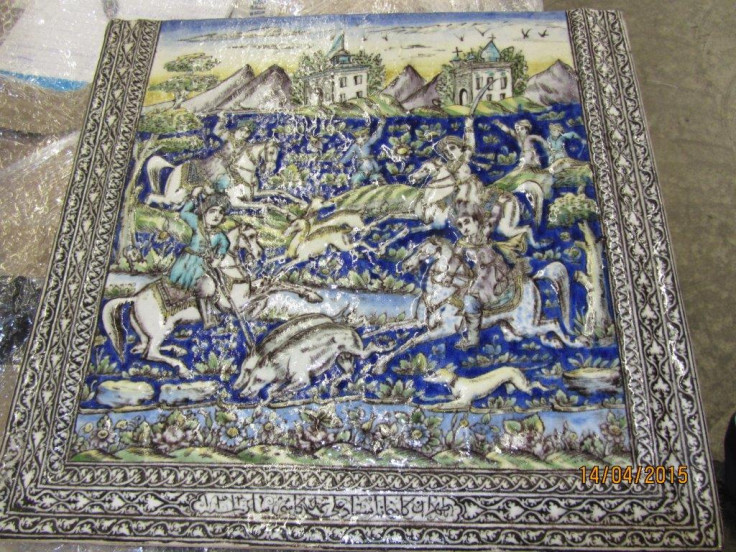Russia-bound 'looted ceramic' was not pillaged from Syrian museum, says antiquities chief

Syria's antiquities chief said that an artefact seized by Finnish authorities on the Russian border after suspicions it was looted art did not come from one of the war-torn country museums.
The blue-coloured ceramic depicting a hunting scene on a rural background was retrieved by Finnish Custom officers from a Russia-bound truck during vehicle controls in April.
The plaque was described in the local press as a 15th century Ottoman pottery pillaged by militant groups in Syria, with detectives initially saying they had reason to believe it did come from there.
Damascus-based antiquities director Maamoun Abdulkarim, however, told IBTimes UK the piece was most likely a more recent Persian ceramic of which there was no record in their archives.
"We asked our experts and the representation of this ceramic is not Syrian art. It is Persian art," he said, adding that it sported an Arabic inscription saying it was made in Tehran in the Islamic year 1313 (1895 AD). "It is not an object that comes from a Syrian museum".
Abdulkarim said it is still possible it was stolen from a Syrian private collection, or left behind by someone who fled the war and subsequently snatched by jihadi militants who sell looted art to fund their fight. However it was quite rare to find this type of artefact in the country, he said.
"It might come from Iraq or from Iran via Iraq," he said, adding that Syria has become a transit land for stolen pieces that are then smuggled into Turkey and then onto the West.
Many of Syria's historic treasures have been plundered since the country erupted into civil war in 2011 and Iraqi antiquities are facing a similar fate since Islamic State (Isis) militants took over large swathes of the country last year.
The terror group, which has infamously destroyed precious and culturally significant antiquities it considers un-Islamic, is reportedly engaged in the lucrative smuggling business.
Finnish Customs anti-crime unit chief Hannu Sinkkonen told IBTimes UK the ceramic was found among other items loaded in the cargo of a small transport company truck, with papers saying it was being shipped from France, but they believed it sourced from the Middle East instead.
Detectives were aware of the identity of the sender but could not provide further information pending an investigation, he said.
The truck driver, a Finn, was not a suspect in the case as detectives believe he was not aware of the contents of his cargo.
Given the systemic dimensions of looting in Syria, in February the UN banned all trade in artefacts from the region.
© Copyright IBTimes 2025. All rights reserved.






















